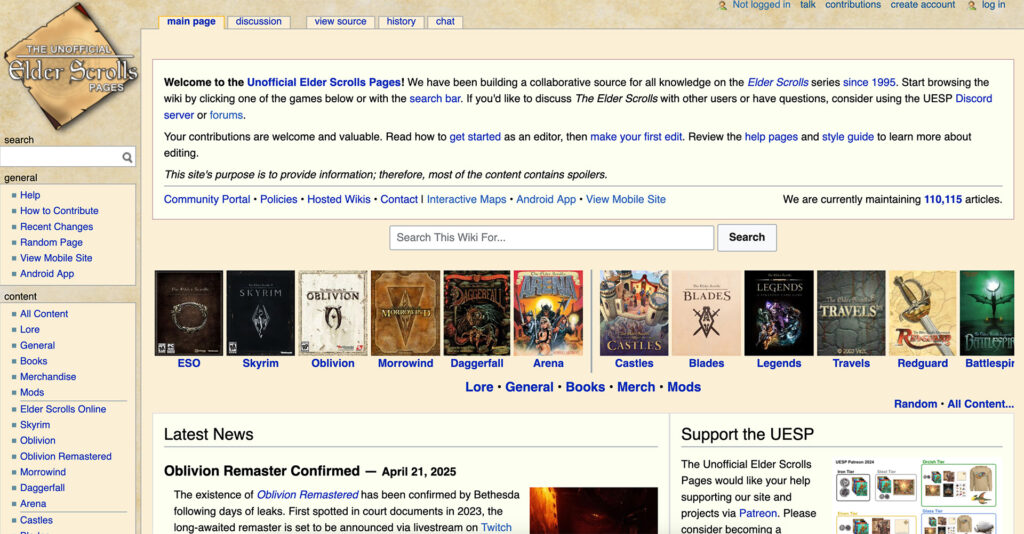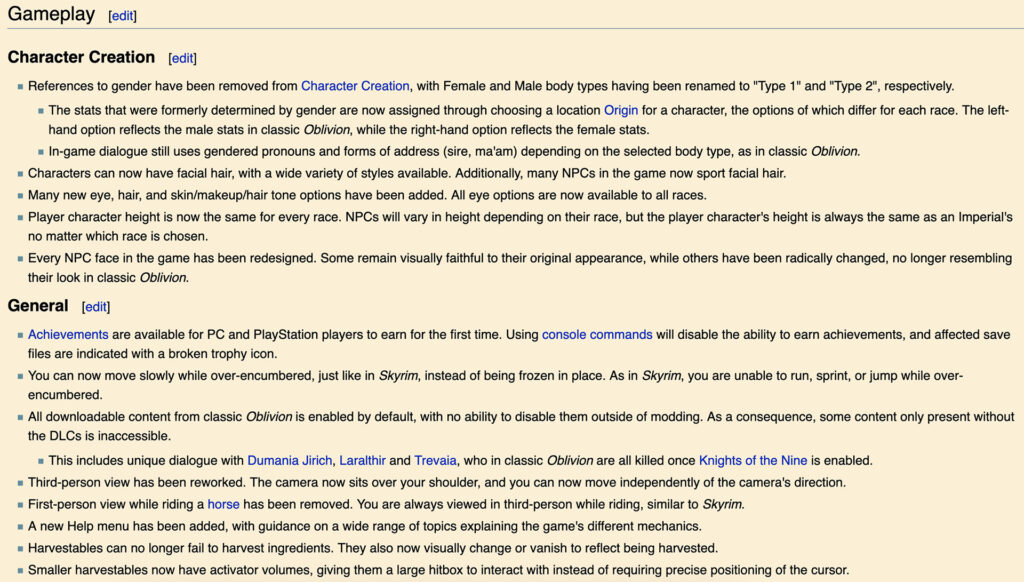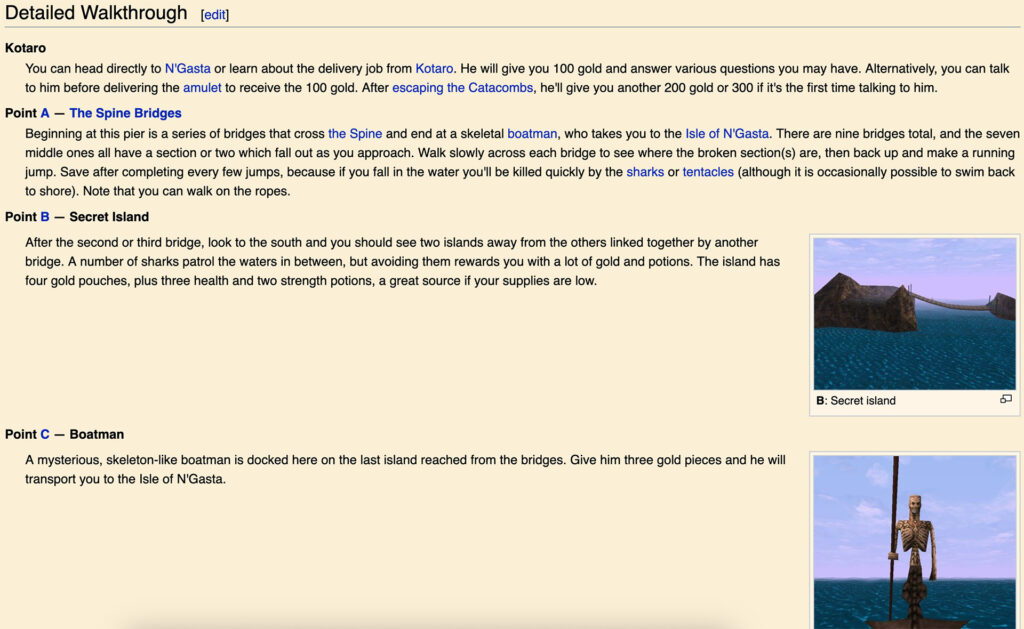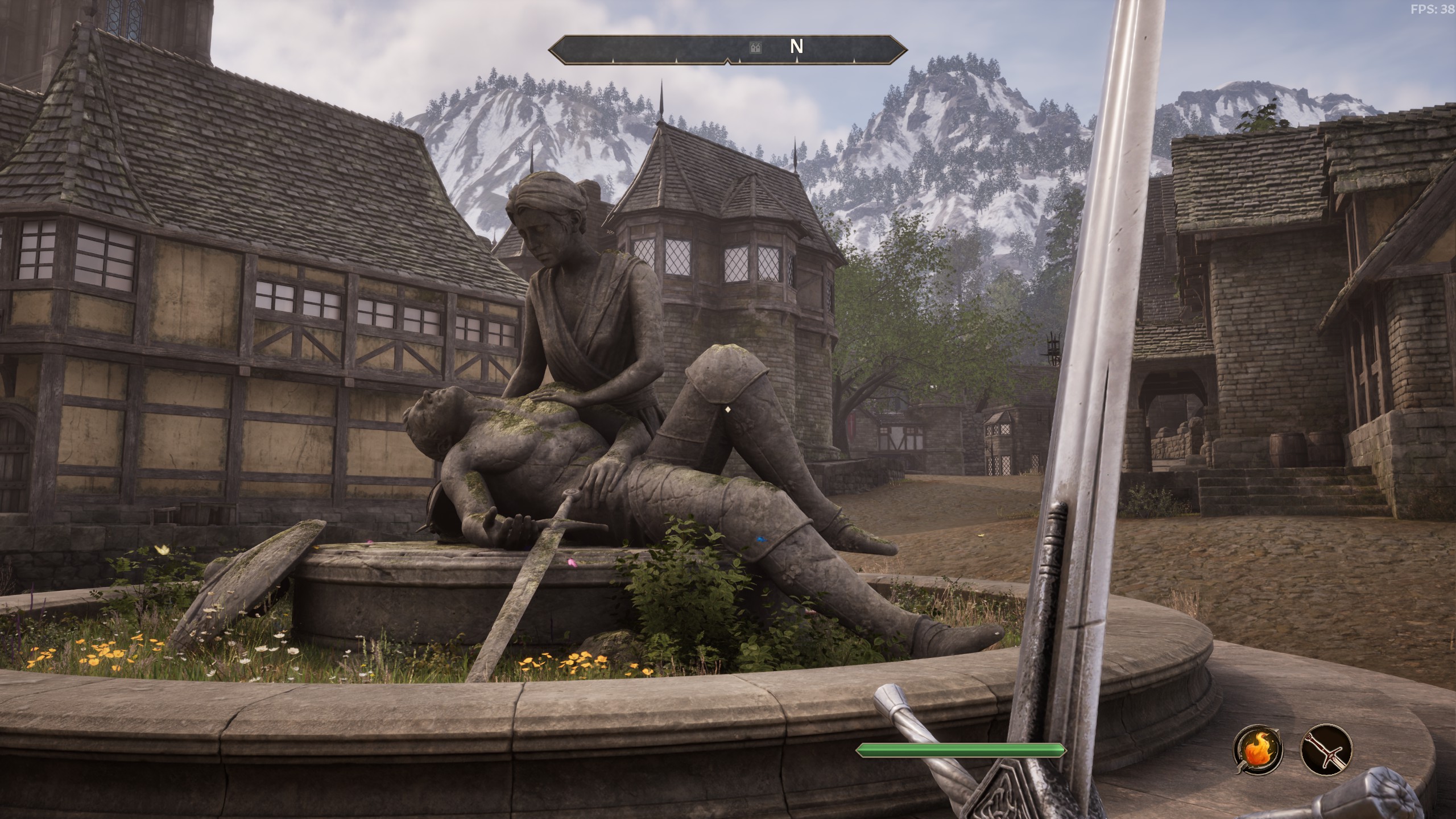Interviewing the people behind the 30-year-old Unofficial Elder Scrolls Pages.
If at some point over the last 20 years you’ve found yourself in an Internet argument or had a question in your head you just couldn’t seem to get rid of, chances are good that you’ve relied on an online wiki.
And you probably used the online wiki: Wikipedia, the free encyclopedia. But for video games, Wikipedia provides a more general, top-down view, painting in broad strokes what a game is about, how it was made, when it was released, and how it was received by players.
In addition, many games and franchises have their own dedicated wikis that go a step further; these wikis are often part game guide, part lore book, and part historical record.
But what does it take to build a game wiki? Why do people do it? I looked to one of my all-time favorite games for answers.
The Unofficial Elder Scrolls Pages
It had been at least 10 years since I last played The Elder Scrolls IV: Oblivion before this past fall, when I decided somewhat arbitrarily to put another 80-or-so hours into a new save. Rushing through the first few parts of the main questline, it felt like I was visiting home, right up until I was named “Hero of Kvatch.”
Then, though, it quickly began to feel like I was playing the game for the first time, and, to put it mildly, I was getting beaten to a pulp across Cyrodiil.
While it was great to re-explore the game that consumed so many hours of my life and discover again what made the 2006 release an instant classic, I was frustrated that I had forgotten how the game worked.
Without the official manual that came with my now surely sold-to-GameStop Xbox 360 edition of the game or the Official Prima Strategy Guide, I quickly found myself (as countless others do) on The Unofficial Elder Scrolls Pages.
Broadly, UESPWiki is an impressive information repository of The Elder Scrolls franchise. It also documents the dense, often convoluted lore of the franchise, as well as books and merchandise sold alongside the games, and the multiple tabletop games.

For all its uniqueness—the sort of early “Web 2.0” design style, limited advertisement space, and its namespace-centered way of organization—the UESP is an independent wiki at its core. It has all the bone structure that makes a wiki accessible and easy to use and is driven by a dedicated community of editors.
The wiki currently maintains over 110,000 articles. The phrase “We have been building a collaborative source for all knowledge on the Elder Scrolls series since 1995” is written at the top of the home page. This year, UESP is celebrating its 30th anniversary.
“The phrase I always say is ‘we’re older than Google,’” said 51-year-old Dave Humphrey, founder of the UESP. “Obviously, we’re not as big or as popular as Google, but we’re older than Google, and we’re older than a lot of websites. In fact, I don't think there's any other Elder Scrolls-related website that's older than us.”
The earliest version of the UESP wasn’t a wiki at all and is just a little older than 30 years. It was a message distributed through USENET called Daggerfall FAQ, originally published in the fall of 1994, and it featured prerelease content about The Elder Scrolls II: Daggerfall.
A year later, the Daggerfall FAQ would become a webpage, and a few months after that, it would become the Unofficial Elder Scrolls Pages, which was just a webpage at the time, to include information about The Elder Scrolls games.
When The Elder Scrolls III: Morrowind released, it was the franchise's biggest game at that point, and Humphrey quickly became remarkably busy. He wrote hundreds of entries for the game and its two DLCs while maintaining his regular job. But the more he did, the more reader emails suggesting new entries and edits to the site came in. In 2005, UESP officially became a wiki.
“It was too much for me to do as a full-time or second full-time job sort of thing,” Humphrey said. “That's when I decided instead of having a regular webpage, we’d move to a wiki-based format where instead of people, you know, emailing me, they can edit their own tips.”
In 2012, Humphrey officially made the UESP his full-time job, but he is largely no longer involved in the content side of the wiki. He instead maintains more of an overseer role, doing most of the back-end server maintenance, programming, and cluster design for the site.
What sets UESP apart, at least from Humphrey’s perspective, is the creativity and decision-making capacity derived from its independence. This allows the team to run the ads they choose and implement new utilities like the ESO Build Editor.
“We've been asked to join larger wiki farms before, and while it might make sense from a technical standpoint, we would lose a lot of what makes UESP unique and long-lasting,” said Humphrey.
In fact, UESP has been slowly expanding over the years and is starting to host wiki sites beyond The Elder Scrolls. In August 2023, the site launched the Starfield Wiki, which already maintains over 10,000 articles and has unofficially taken over all the construction set wikis for the Elder Scrolls and Fallout franchises. Currently, Humphrey said, UESP is looking at hosting a few more existing game wikis later this year.
As for the Elder Scrolls series itself, The Elder Scrolls VI is still well into the future. But at the time of my interview, the Oblivion remaster was just social media speculation. Still, Humphrey predicted how the game might change the wiki.
“It comes down to the organization of the site. We sort of have to deal with that a bit with DLCs. There’s the base game, and then there’s the DLCs; for the most part, DLCs are their own contained area, but they do modify the base game as well,” said Humphrey.
“We’d probably take a similar approach with it, creating their own namespace underneath Oblivion and putting all the remake information there,” he added.
It’s always a challenge to determine how to organize things like DLCs and remakes into the wiki, Humphrey said. He noted that he would ultimately leave it up to the editors themselves.
Since the release of Oblivion Remastered, the game has, in fact, received its own namespace, and editors are already documenting some of the changes.

When it was still the Daggerfall FAQ, Humphrey wasn’t thinking about what it would look like in 2025 or how a community could be built around a website; he was simply someone with a passion for the game who liked building things.
But as time went on and Humphrey began attending conventions and Elder Scrolls-related meetups, he started to realize the kind of community that had naturally formed around the site.
“It's not something I planned on doing, but it's really neat, and it's something I'm more aware of now in terms of doing community-related stuff,” Humphrey said.
That community, which has over 23,000 users with at least one edit in its history, measures the success of the wiki not by the quantity of content but the quality of the pages themselves. Humphrey leaves most of the content decisions up to those editors.
Scraping and editing
Robert “RobinHood70” Morley—a 54-year-old native of Ottawa, Canada—has been editing the pages since May 2006, just a short time after UESP turned into a wiki, while playing through Oblivion.
He explained that he found the wiki at a critical time, shortly after he fell ill with a sickness that doctors struggled to diagnose.
“Getting involved in the wiki provided a bit of a refuge from that,” Morely wrote through Discord. “I could forget how I felt (to some degree) and focus instead on what was going on the wiki. Because I couldn't really leave the house much anymore, I made friends on the wiki instead and let that replace the real-life social life that I couldn't have anymore… That continues to be the case even now.”
He didn’t necessarily set out to find that kind of community, which was much smaller at the time, but he recognized that it was helping him cope with things. Not only did editing give him a sense of accomplishment, but he enjoyed seeing what others were able to do.
Over the years, Morely’s involvement in the wiki has grown. He’s gone from a regular user to an admin to a bureaucrat. He’s the only editor with access to the servers other than Humphrey. He now does the critical job of running bots through the game pages that add bulk information to the wiki.
“In some sense, a bot is like any other editor. It adds/changes/removes information on the wiki. The difference is that it does so several thousand times faster,” Morley said. “Bots are often used to bulk-upload information from the game files to the wiki. For example, they might provide the initial documentation of every NPC in a game… They would provide the hard stats, but afterward, people would expand the page to provide a narrative for each character.”
When an Elder Scrolls Online update goes live, for example, Morley quickly deploys the bot, which detects any changes in the new versions of the game, such as skill and stat adjustments. All that added information is dumped into the wiki to provide human editors with a base to start from.
That’s similar to the process of creating pages for a brand-new Elder Scrolls game. The game would be scraped shortly after it was released, and editors would get busy trying to figure out how those pieces fit together.
Once created, the pages would be edited and continuously retouched over time by other editors.
Those editors include people like 26-year-old Dillon “Dillonn241” D., who has been a part of the wiki for over half of his life. He first discovered and began editing pages of the UESP at 11 or 12 years old.
While his activity on the wiki has ebbed and flowed over the years based on interest and the demands of daily life, he says the community is a big part of what keeps him coming back—the near-endless nature of collaboratively working on a project. He enjoys the casual conversations on the wiki's Discord server, as well as the more focused and pragmatic discussions about editing through internal channels.
He has since become a prolific editor and was awarded a “gold star” on his talk page last year for editing more pages than anyone in 2024, with a total of 18,864 edits.
“I don’t want to call it an addiction because that makes it sound bad, but it’s kind of like—you know, I guess I have an hour here. I'll just hop on UESP and edit a few pages or see how things I’ve edited have been doing.”
Most of those edits, he explained, were likely minor, things like fixing grammar, sentence structure, and formatting to better conform to the wiki’s internal style guide. In this way, he considers himself a “WikiGnome”—someone who makes small, incremental edits to pages and makes changes behind the scenes.
When he’s in the mood to do some editing, he’ll jump around the wiki using the random button for a couple of hours and make changes.
All those hours have given him not only refined copy editing skills but also a serious familiarity with the pages. Dillion says he can jump on just about any page and find at least one of his edits on it.
He has done a lot of work on the namespaces for the Tamriel Rebuilt mod and essentially rewrote the entire namespace for The Elder Scrolls Adventures: Redguard, a game he doesn't particularly enjoy playing but started on a whim.
“At some point, I stumbled across the wiki section for it and was like, well this is nothing, this is awful,” he explained.
He recalled getting stuck on a section of the game, and the wiki wasn't able to help him. He was able to stumble through the game but decided he would completely fix its entries so they would be more helpful to future players.
Now, the Redguard namespace includes detailed descriptions of the quests, characters, and items, along with photos, most of which Dillion took himself. He says that if the game and all its files were somehow wiped from the earth, developers would be able to remaster the entire game in Unity based just on what’s in the wiki.

“I guess that’s kind of the end goal,” he said, “and some of the namespaces are kind of close, like Oblivion I would say is kind of close to where the things that you can still add to the page are getting minimal.”
Efforts all over
While Dillion is a more prolific editor than most and Morley plays a more specific role in the wiki than others—and Humphrey represents the original jumping off point for the former two—it’s the combined effort of thousands of editors like them that make the UESP what it is.
And across the Internet, there are equally involved editors working on an endless number of wikis toward similar goals. In a way, they are remaking the games they love in a text-based format.
At their core, these community efforts help players get through games in a time when physical guides often no longer exist. But in the aggregate, deeper, centralized insights into these games can ultimately contribute to something new. A record over time of how a game changes and how it works can lead to discovery and debate. In turn, that could spark inspiration for a mod—or a new game entirely.
Hope you enjoyed this news post.
Thank you for appreciating my time and effort posting news every day for many years.
News posts... 2023: 5,800+ | 2024: 5,700+ | 2025 (till end of April): 1,811
RIP Matrix | Farewell my friend ![]()



3175x175(CURRENT).thumb.jpg.b05acc060982b36f5891ba728e6d953c.jpg)
Recommended Comments
There are no comments to display.
Join the conversation
You can post now and register later. If you have an account, sign in now to post with your account.
Note: Your post will require moderator approval before it will be visible.